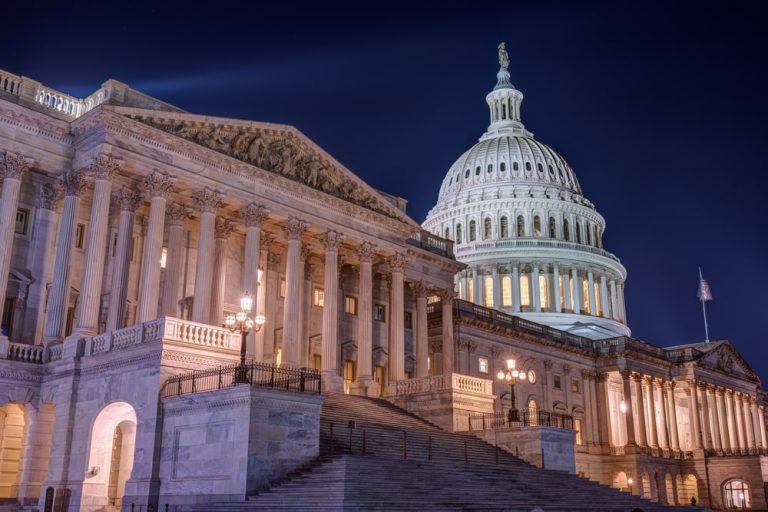This month in Washington, D.C., President Biden’s proposed FY 2025 budget, a temporary halt to the SEC’s climate change reporting rule, long-awaited draft rules on how critical-infrastructure companies must report cyberattacks to the government, and more. In this month’s ICR D.C. Insider, we share our insights and analysis about developments in Washington that could have an immediate and long-term impact on your business.
What’s Next In Washington
- Biden Proposes Fiscal Year 2025 Budget & Republicans Denounce It – President Biden proposed a $7.3 trillion budget packed with tax increases on corporations and high earners, new spending on social programs, and a wide range of efforts to combat high consumer costs like housing and college tuition. The proposal is even more of a political messaging exercise than usual, given that the new fiscal year begins on October 1, 2024, just weeks before voters head to the polls. Congress is likely to punt major government funding decisions until after Election Day.
-
- The Biden budget proposes to quadruple a tax on corporate stock buybacks in a bid to direct companies to funnel additional cash toward their operations and employees – rather than toward boosting their own shares. The 4 percent tax on share repurchases could generate $166 billion, the White House said. By way of background, Biden signed into law a 1 percent stock buyback tax in 2022 as part of the Inflation Reduction Act.
SEC
- Climate Change Reporting Rule Temporarily Halted – As expected, legal challenges from business groups – who say the Securities and Exchange Commission’s (SEC) rules go too far and environmental organizations who say the rules doesn’t go far enough – resulted in the Fifth U.S. Circuit Court of Appeals granting an administrative stay of the rules. The stay is the first move against the SEC in what is likely to be a protracted battle over the rules as lawsuits work their way through courts around the country. Litigation over the rules is likely to cause some companies to delay compliance plans, but others will still see a need to prepare for the 2026 deadline set by the SEC.
-
- At the same time, California is pushing ahead with its first-in-the-nation corporate emissions reporting law despite legal and funding obstacles. While Democrat Gov. Gavin Newsom didn’t include funding for the rule in his budget proposal, California Air Resources Board Chair Liane Randolph said, “At the end of the day, we’re assuming that we will get funded, and we will be able to do some hiring and we will be able to get going.”
FTC
- AI Standard Proposed for FTC Enforcement – A pair of Senate Commerce Committee lawmakers – Sens. Ben Luján (D-N.M.) and Peter Welch (D-Vt.) – introduced “The Artificial Intelligence Consumer Opt-In, Notification Standards, and Ethical Norms for Training (“AI CONSENT”) Act,” legislation which would require online platforms to obtain the express informed consent of a consumer before using their personal data to train artificial intelligence (AI) models. Failure to obtain informed consent would be considered a deceptive or unfair practice subject to enforcement by the Federal Trade Commission (FTC). The bill also directs the FTC to study the efficacy of data de-identification given AI’s advancement.
- A Full Five-Member Commission – Following their confirmation by the Senate, Republicans Andrew Ferguson and Melissa Holyoak have joined the Commission, bringing it to full strength. Democrats under Chair Lina Khan still hold a 3-2 majority.
- Healthcare Under Examination – Along with the Department of Justice’s (DOJ) Antitrust Division and the U.S. Department of Health and Human Services (HHS), the FTC jointly launched a cross-government public inquiry into private equity and other corporations’ increasing control over health care. With an announcement framed as an investigation into the “Impact of Corporate Greed in Health Care,” the three agencies issued a Request for Information (RFI) asking for public comment on deals conducted by health systems, private payers, private equity funds, and other alternative asset managers that involve health care providers, facilities, or ancillary products or services. The RFI also requests information on transactions that would not be reported to the Justice Department or FTC for antitrust review under the Hart-Scott-Rodino Antitrust Improvements Act.
Labor
- NLRB
- Court Vacates Joint Employer Rule – A federal judge delivered a victory for big franchisers by vacating the National Labor Relations Board’s (NLRB) joint employer rule, that would have held big franchisers liable for the working conditions of franchisees’ employees. In his ruling, the judge found that the rule would have been “contrary to law” and “arbitrary and capricious.” The NLRB is considering an appeal.
Cyber Security
- Draft Federal Rules for Cyber Incident Reporting Published – The U.S. Cybersecurity and Infrastructure Security Agency (CISA) published long-awaited draft rules on how critical-infrastructure companies must report cyberattacks to the government. Under the 447-page draft rules, companies that own and operate critical infrastructure would need to report significant cyberattacks within 72 hours and report ransom payments within 24 hours. The rules apply to any company owning or operating systems the U.S. government classifies as critical infrastructure, such as healthcare, energy, manufacturing and financial services. The rules will also apply to companies that don’t operate critical infrastructure, but whose systems may be vital to a particular sector, such as service providers. CISA is seeking public comment on the draft rules for 60 days.
Trade
- Congress Considers Export Control Changes – The House passed legislation to change the interagency procedure used to decide export control licensing decisions. The legislation would remove the ability of the Department of Commerce to veto export licensing decisions over the objections of the departments of Defense, State, and Energy. Currently, the Department of Commerce’s Bureau of Industry & Security (BIS) chairs the interagency taskforce which considers export licensing decisions when any of the other departments files an objection. The legislation, if passed by the Senate, would allow BIS to grant or deny a contested license only in the event of a tie vote. The legislation would also mandate that the interagency panel meet and vote on any export licenses to Belarus, Burma, China, Cuba, Iran, North Korea, Syria, Russia, or Venezuela.
- Big Corporate Mergers Get Fresh Tax Scrutiny – A progressive Democrat and a populist Republican are teaming up to attack big mergers, with a new proposal that would remove a cornerstone of the corporate tax code and potentially reshape dealmaking. Sens. Sheldon Whitehouse (D-R.I.) and D. Vance (R-Ohio) want to eliminate companies’ ability to do tax-free mergers. Under their bill, shareholders who receive stock through such deals would owe capital-gains taxes immediately, instead of deferring those taxes until they sell their shares. The senators introduced the legislation with exceptions for companies with annual revenue below $500 million.
Additional Key Developments
- China
- Bipartisan legislation seeks to pressure the Biden Administration to perform a comprehensive threat analysis of the dangers posed by economic integration with China. The American Economic Independence Act would require the President to conduct “a comprehensive threat analysis of the national security risks posed by economic integration with China in key economic sectors such as financial services, artificial intelligence, critical minerals, and manufacturing.” The legislation is sponsored by Mitt Romney (R-Utah) and Senate Finance Committee member Catherine Cortez Masto (D-Nev.), as well as Senate Finance Trade Subcommittee Ranking Member John Cornyn (R-Texas), Finance Committee members James Lankford (R-Okla.), Sherrod Brown (D-Ohio), and Todd Young (R-Ind.).
- Mike Gallagher (R-Wisc.) is leaving Congress this month, with Rep. John Moolenaar (R-Mich.) taking over the chairmanship of the House Select Committee on the Strategic Competition Between the United States and the Chinese Communist Party. Rep. Moolenaar said he looks forward to working with Ranking Member Raja Krishnamoorthi (D-Ill.) to help the U.S. “win the competition” against China.
- The U.S. continues to assess if China’s SMIC broke U.S. rules to power Huawei’s Mate 60 Pro phone, Alan Estevez, Under Secretary of Commerce for Industry and Security, told Michael McCaul (R-Texas), Chairman of the House Foreign Affairs Committee.
- J.D. Vance (R-Ohio) introduced a new bill that would restrict China from accessing American financial markets and exchanges if the country continues to violate international financial law, manipulate their currency, abuse transparency and disclosure rules, or refuse to fulfill more than $1 trillion of defaulted debt obligations to American citizens. Senator Vance’s legislation mandates that the Treasury Department and Committee on Foreign Investment in the U.S. (CFIUS) take action against China for its refusal to follow financial international rules and norms.
- House Committee on Oversight and Accountability Chairman James Comer (R-Ky.) is conducting oversight of the Public Company Accounting Oversight Board’s (PCAOB) inspections and investigations of accounting firms conducting audits for companies based in China. In a letter to PCAOB Chair Erica Williams, Rep. Comer requested documents and information to assist the Committee’s inquiry into how PCAOB applies federal law with respect to audits of China-based companies.



